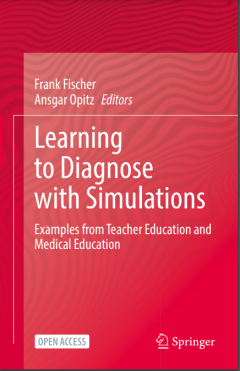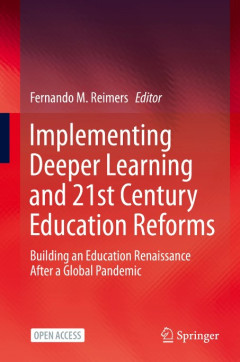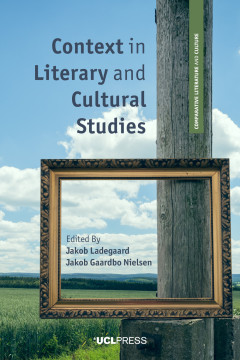Filter by

Research on teaching and learning probability
This book summarizes the vast amount of research related to teaching and learning probability that has been conducted for more than 50 years in a variety of disciplines. It begins with a synthesis of the most important probability interpretations throughout history: intuitive, classical, frequentist, subjective, logical propensity and axiomatic views. It discusses their possible applications, p…
- Edition
- -
- ISBN/ISSN
- 9783319316253
- Collation
- -
- Series Title
- -
- Call Number
- 519.2071 BAT r

Gender and STEM :understanding segregation in science, technology, engineerin…
This volume features thirteen original chapters on the causes and consequences of gender segregation in scientific, technical, engineering, and mathematics (“STEM”) occupations and fields of study. Although women have made great strides in equalizing access to labor markets and higher education, many STEM fields—particularly in the physical sciences and engineering—remain strongholds of…
- Edition
- -
- ISBN/ISSN
- 9783038971474
- Collation
- ix, 271p. : ill.
- Series Title
- -
- Call Number
- 510.71 GEN g

Instructional scaffolding in STEM education :strategies and efficacy evidence
This book uses meta-analysis to synthesize research on scaffolding and scaffolding-related interventions in STEM (science, technology, engineering, and mathematics) education. Specifically, the volume examines the extent to which study quality, assessment type, and scaffolding characteristics (strategy, intended outcome, fading schedule, scaffolding intervention, and paired intervention) influe…
- Edition
- -
- ISBN/ISSN
- 9783319025650
- Collation
- xi, 144p. : ill.
- Series Title
- -
- Call Number
- 510.71 BEL i

Humanities Research Centre :a history of the first 30 years of the HRC at the…
Humanities; Research; History
- Edition
- -
- ISBN/ISSN
- 9789751229830
- Collation
- xiii, 400p. : ill.
- Series Title
- -
- Call Number
- 001.307119471 BAR h

Chapter 4 preschool education
"The Routledge Handbook of Translation and Education will present the state of the art of the place and role of translation in educational contexts worldwide. It lays a sound foundation for the future interdisciplinary cooperation between Translation Studies and Educational Linguistics. By adopting a transdisciplinary perspective, the handbook will bring together the various fields of schol…
- Edition
- -
- ISBN/ISSN
- 9780367854850
- Collation
- 64-80p.: ill.
- Series Title
- -
- Call Number
- 418.02 COR c

Social and political dimension of mathematics education:current thinking
This book examines the current thinking on five critical social and political areas in mathematics education. It focuses on material conditions in teaching and learning, and details features of social life and their influence on mathematics teaching, learning and achievement. Following an introduction, the first section addresses equitable access and participation in quality mathematics educati…
- Edition
- -
- ISBN/ISSN
- 9783319296555
- Collation
- vii, 37p.:
- Series Title
- -
- Call Number
- 370

Garden learning :a study on European botanic gardens' collaborative learning …
"From 2007-2013 the European 7th Framework Program Science in Society (FP7) funded a multitude of formal and informal educational institutions to join forces and engage in alternative ways to teach science—inside and outside the classroom—all over Europe. This book reports on one of these projects named INQUIRE which was developed and implemented to support 14 Botanic Gardens and Natural Hi…
- Edition
- -
- ISBN/ISSN
- 9781909188662
- Collation
- vi, 185p. : ill.
- Series Title
- -
- Call Number
- 370 KAP g

Drawing education :wordwide! : continuities - transfers - mixtures
As a cultural technique, drawing was firmly anchored in the realities of European society from early modern to modern times. Based on this fact, the present volume asks for the first time about the significance of drawing and drawing education in other cultural areas. Indigenous methods of drawing and sign-learning in Arabic, Asian, Latin American, North American and European countries are addr…
- Edition
- -
- ISBN/ISSN
- 9783947732302
- Collation
- vii, 323p. : ill.
- Series Title
- -
- Call Number
- 370 NAN d

Traditions in German-speaking mathematics education research
This open access book shares revealing insights into the development of mathematics education research in Germany from 1976 (ICME 3 in Karlsruhe) to 2016 (ICME 13 in Hamburg). How did mathematics education research evolve in the course of these four decades? Which ideas and people were most influential, and how did German research interact with the international community? These questions are a…
- Edition
- -
- ISBN/ISSN
- 9783030110697
- Collation
- viii, 278p. : ill.
- Series Title
- -
- Call Number
- 370 JAH t

Modern mathematics education for engineering curricula in Europe :A comparati…
- Edition
- -
- ISBN/ISSN
- 9783319714165
- Collation
- VI, 182 p.
- Series Title
- -
- Call Number
- 370 MOD m
- Edition
- -
- ISBN/ISSN
- 9783319714165
- Collation
- VI, 182 p.
- Series Title
- -
- Call Number
- 370 MOD m

Interdisciplinary mathematics education :a state of the art
This book provides an essential introduction to the state-of the-art in interdisciplinary Mathematics Education. First, it begins with an outline of the field’s relevant historical, conceptual and theoretical backgrounds, what “discipline” means and how inter-, trans-, and meta-disciplinary activities can be understood. Relevant theoretical perspectives from Marx, Foucault and Vygotsky ar…
- Edition
- -
- ISBN/ISSN
- 9783319422671
- Collation
- vii, 36p. ill.
- Series Title
- -
- Call Number
- 510.71 WIL i

Collaboration in Designing a Pedagogical Approach in Information Literacy
This Open Access book combines expertise in information literacy with expertise in education and teaching to share tips and tricks for the development of good information literacy teaching and training in universities and libraries. It draws on research, knowledge and pedagogical practice from academia, to teach students how to sift through information to be able to distinguish the important an…
- Edition
- -
- ISBN/ISSN
- 9783030342586
- Collation
- xi, 161p.: ill.
- Series Title
- -
- Call Number
- 028.7071 lan c

Teaching in blended learning environments:Creating and sustaining communities…
- Edition
- -
- ISBN/ISSN
- 9781927356487
- Collation
- x, 142p.: ill.
- Series Title
- -
- Call Number
- 371.3 vau t
- Edition
- -
- ISBN/ISSN
- 9781927356487
- Collation
- x, 142p.: ill.
- Series Title
- -
- Call Number
- 371.3 vau t

Theorizing teaching :current status and open issues
This open access book seeks to create a forum for discussing key questions regarding theories on teaching: Which theories of teaching do we have? What are their attributes? What do they contain? How are they generated? How context-sensitive and content-specific do they need to be? Is it possible or even desirable to develop a comprehensive theory of teaching? The book identifies areas of conver…
- Edition
- -
- ISBN/ISSN
- 9783031256134
- Collation
- xx, 367p: ill.
- Series Title
- -
- Call Number
- 375 THE t

Planning and analyzing teaching:using the variation theory of learning
Using illustrative teaching case studies, this book demonstrates how teaching informed by a learning theory, specifically variation theory, can equip teachers to facilitate possibilities for students' learning in effective and powerful ways. For a long period of time teaching has been "black-boxed", in favour of other explanations of why students learn or not, such as motivation and social inte…
- Edition
- -
- ISBN/ISSN
- 9781003194903
- Collation
- xiii, 103 pages; illustration
- Series Title
- -
- Call Number
- 371.102 KUL p

Learning to diagnose with simulations :examples from teacher education and me…
This open access book presents 8 novel approaches to measure and improve diagnostic competences with simulation. The book compares the effects of interventions on these diagnostic competences in both teacher and medical education. It includes analyses showing that important aspects of diagnostic competences and effects of instructional interventions aiming to facilitate them are comparable for …
- Edition
- -
- ISBN/ISSN
- 9783030891473
- Collation
- vi; 157p;
- Series Title
- -
- Call Number
- 616.075 LEA F

Learning to diagnose with simulations :examples from teacher education and me…
This open access book presents 8 novel approaches to measure and improve diagnostic competences with simulation. The book compares the effects of interventions on these diagnostic competences in both teacher and medical education. It includes analyses showing that important aspects of diagnostic competences and effects of instructional interventions aiming to facilitate them are comparable for …
- Edition
- -
- ISBN/ISSN
- 9783030891473
- Collation
- vi; 157p;
- Series Title
- -
- Call Number
- 616.075 LEA F

Implementing Deeper Learning and 21st Century Education Reforms :Building an …
This open access book is a comparative analysis of recent large scale education reforms that broadened curriculum goals to better prepare students for the 21st century. The book examines what governments actually do when they broaden curriculum goals, with attention to the details of implementation. To this end, the book examines system level reforms in six countries at various levels of develo…
- Edition
- -
- ISBN/ISSN
- 9783030570392
- Collation
- viii, 198 p.
- Series Title
- -
- Call Number
- 370.116 IMP F

Learning, philosophy, and African citizenship
This open access book discusses and addresses the compelling questions concerning the ideals of citizenship, the processes of learning to fulfill these ideals, and possibilities of education in fostering citizenship. Rather than advocating for one framework, the authors demonstrate the continuously contested nature of the concept of citizenship as theoretically discussed and practically experie…
- Edition
- -
- ISBN/ISSN
- 9783030948825
- Collation
- XIII, 221 p ; ill
- Series Title
- -
- Call Number
- 370.115 LEA

Context in literary and cultural studies
Context in Literary and Cultural Studies is an interdisciplinary volume that deals with the challenges of studying works of art and literature in their historical context today. The relationship between artworks and context has long been a central concern for aesthetic and cultural disciplines, and the question of context has been asked anew in all eras. Developments in contemporary culture and…
- Edition
- -
- ISBN/ISSN
- 9781787356245
- Collation
- xv, 210 p. ill;
- Series Title
- -
- Call Number
- 809 CON J
 Computer Science, Information & General Works
Computer Science, Information & General Works  Philosophy & Psychology
Philosophy & Psychology  Religion
Religion  Social Sciences
Social Sciences  Language
Language  Pure Science
Pure Science  Applied Sciences
Applied Sciences  Art & Recreation
Art & Recreation  Literature
Literature  History & Geography
History & Geography